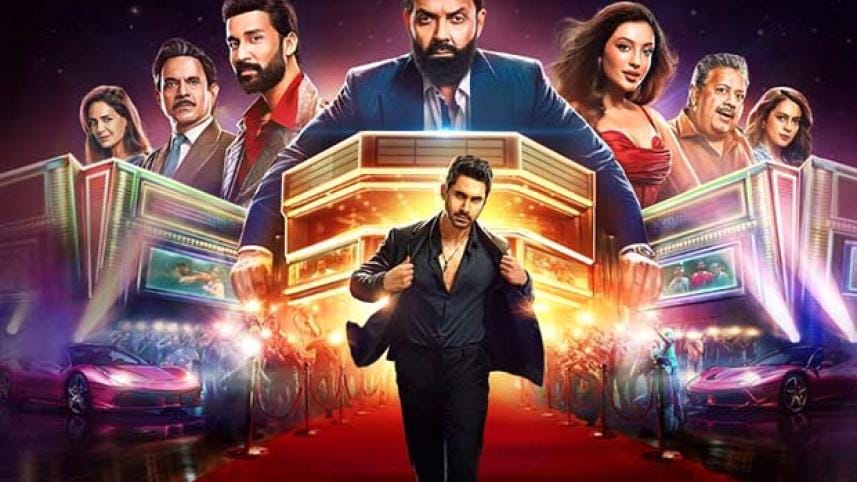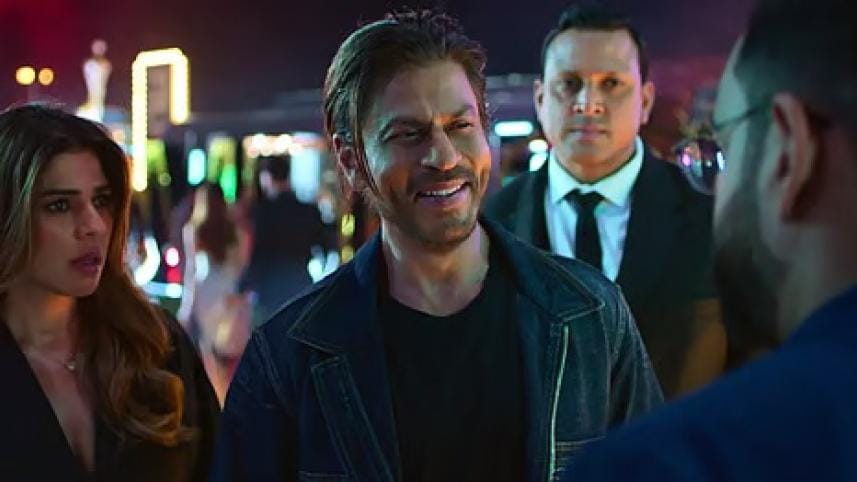"The Ba***ds of Bollywood": All shine, no spine

"The Ba***ds of Bollywood" arrives like a party that knows it is both entertaining and dangerous to attend. It is gleefully loud, crammed with cameos and inside jokes, and built out of the familiar ingredients of commercial Hindi cinema. At the same time, it repeatedly lets loose sharp, uncomfortable flashes that refuse to be smoothed over. Watch it as a satire and you will laugh often. Watch it as an indictment and you will feel the edges. The series wants to do both things at once, and that ambition is its central thrill and also its chief flaw.
On the surface, this is the origin story of Aasmaan Singh, an outsider from Delhi who shoots to fame after his surprise hit "Revolver". Lakshya Lalwani plays Aasmaan with a credible blend of swagger and vulnerability. He walks into contracts, launches into romances, and becomes a totem for the industry's appetite for fresh faces. The show surrounds him with archetypes and performers who revel in the broad strokes. Manish Chaudhari's Freddy Sodawallah is an oily studio head who signs Aasmaan to a chokehold of a three films deal. Bobby Deol's Ajay Talwar is the reigning star, alternately menacing and rueful, determined to protect his dynasty. Sahher Bambba's Karishma is the heiress opposite whom Aasmaan is cast, and Anya Singh's manager Sanya and Raghav Juyal's Pervaiz give the story its comic and human center. A strong supporting ensemble including Mona Singh, Manoj Pahwa and Rajat Bedi rounds out a cast that knows how to ham it up when the script demands and to land quieter notes when given the chance.

The tone is deliberately exaggerated. Cameos and celebrity self-parody arrive often and in droves. Stars such as Salman Khan and Shah Rukh Khan turn up in satirical riffs on their public images. These moments are a large part of the series' pleasure. They create a game of recognition for viewers familiar with industry lore, and they allow the show to surf the current cultural preoccupation with nepotism, fandom and scandal. Much of the humour lands precisely because the programme leans into the absurdity of the film world that celebrates itself even as it cannibalises its margins. Where the series grows interesting is when it punctures its own levity with scenes of corrosive behaviour. The show does not shy away from uglier realities. Producers brag about past abuses. A studio head can be violent towards the crew. An underworld figure can enforce his tastes with a gun. These moments break the joke format and demand a different response. They expose how spectacle can entrench power and how, under the gloss and the soundtrack, there is a quieter, harsher economy at work. The effect is jolting. The series invites us to laugh and then, in the next breath, to look more critically at the machinery that produces the things we love.
What gives this show its peculiar punch is how it doubles down on meta references and industry inside jokes, almost as if it were scripted in a Reddit gossip thread. Aryan Khan does not just toss in nods, he builds entire gags around them. Karan Johar, for instance, slides into frame as the full-fledged caricature of the "movie mafia," gleefully warning Aasmaan Singh in an elevator not to mess with the mafia. Or, Emraan Hashmi turning up in the most tongue-in-cheek cameo of his career, rebranded as an intimacy coach, while Raghav Juyal's Parvaiz can barely contain his fanboying. Salman Khan's muttered "bullshit party" at a birthday dinner, Rajkummar Rao and Arjun Kapoor spoofing Abhishek Bachchan and Akshay Kumar's award-show antics from "Om Shanti Om", and Shah Rukh Khan himself gamely letting his "Baadshah" ego get shredded twice at ceremonies are all moments that push the satire into absurd but oddly cathartic territory.

It is a circus of Bollywood lore where gossip, memes, and scandals become plot devices, and the viewer's own memory of internet discourse becomes part of the show's fuel. By weaving in lines like "Say No to Drugs" immediately before the "Directed by Aryan Khan" credit, or staging a Sameer Wankhede lookalike chanting "Bollywood is druggist," Aryan does not just parody Bollywood, he parodies the way Bollywood has been consumed, dissected, and mocked over the last decade.

That jolt, however, also reveals the show's limits. Tonal whiplash is frequent and the tonal shifts are not always handled with the finesse the material needs. When the series swings from broad pastiche into grim social critique it sometimes forgets to carry character logic with it. An emotional beat will arrive, heavy and earnest, only to be undercut two scenes later by a sketch comedy gag. The show's appetite for signposting and wink lines can dilute the potency of the more serious moments. When it seeks pathos, the writing occasionally pulls back to satire before the viewer has had time to fully register what was being asked of them.
Structurally, the most interesting choice is what the show largely refuses to do. Across its episodes, there are remarkably few on-set sequences showing the actual work of filmmaking. Instead, the action happens in boardrooms, on red carpets, in private chats and behind closed doors. That absence is less a mistake than a thesis. By refusing to dramatize production mechanics, the series suggests that the contemporary spectacle of Bollywood is less about craft and more about contracts, optics and networks. The movies, in other words, become performative wrappers for a different set of dramas. It is a bold critique, and in the finale the show leans into it further with a twist that reframes earlier tributes to the industry as hollow rituals. That final pivot is audacious. For some viewers it lands as a clever denouement. For others it will feel like a contrivance that retrofits meaning onto a largely episodic satire. The writing demonstrates a particular fondness for detail. There are recurring gags that work brilliantly, a handful of one liner that will linger, and small observational flourishes about awards culture, PR gimmicks and the perverse incentives of fame. When the humour is specific and rooted in the particularities of film industry life it cuts deep. When it drifts into generic lampooning it flattens. Product placement is everywhere, sometimes too obviously, and that overtness works against the show's satirical ambitions by making some sequences feel like advertorials rather than critique.

Performance-wise the series often finds the right register. Raghav Juyal is a scene-stealer as Pervaiz, bringing breathless energy and a comic intelligence that humanises the satire. Bobby Deol gives a layered performance that toggles between cartoonish intensity and unexpected vulnerability. Manish Chaudhari excels as the greasy studio boss who manages to be both ridiculous and credible. Lakshya Lalwani breaks the newcomer mold by making Aasmaan's ascent feel less like an archetypal rags to riches tale and more like a collision between charisma and consequence. The show's many cameos are uneven but intentionally so. They are less guest star stunt casting and more commentary on the industry's reflex to show up for its own mythology.
If the series frustrates, it is because it wants to be both a riotous send-up and a serious exposé and because it does not always reconcile those aims. Serious issues such as predation, exploitation and the moral compromises of fame are introduced but not always interrogated with the depth they deserve. The satire can sometimes excuse itself by leaning on laugh tracks and cameos rather than sustaining the moral inquiry it briefly peers at. The sting is felt but seldom held. Ultimately "The Ba***ds of Bollywood" is best approached on its own terms. It is a show that loves the theatre of film while simultaneously calling attention to the theater's backstage rot. It will reward viewers who delight in spotting in-jokes, who enjoy watching performers play versions of themselves, and who appreciate satire that can be both affectionate and savage. It will frustrate viewers who come seeking a rigorous, investigative takedown or a tightly disciplined drama about exploitation.
The series is uneven, noisy and intermittently brilliant. It is a mirror held up to an industry of mirrors. It makes you laugh and then it makes you look. For all its theatrical excesses, it says something true about the current moment in Indian cinema: that the stories we see are often less about the art being made and more about the power that decides which art will be seen. Whether that conclusion feels like revelation or like confirmation of what you already suspected depends on how much you are willing to sit with the show's contradictions. Either way, it is difficult to stop watching.




 For all latest news, follow The Daily Star's Google News channel.
For all latest news, follow The Daily Star's Google News channel.
Comments